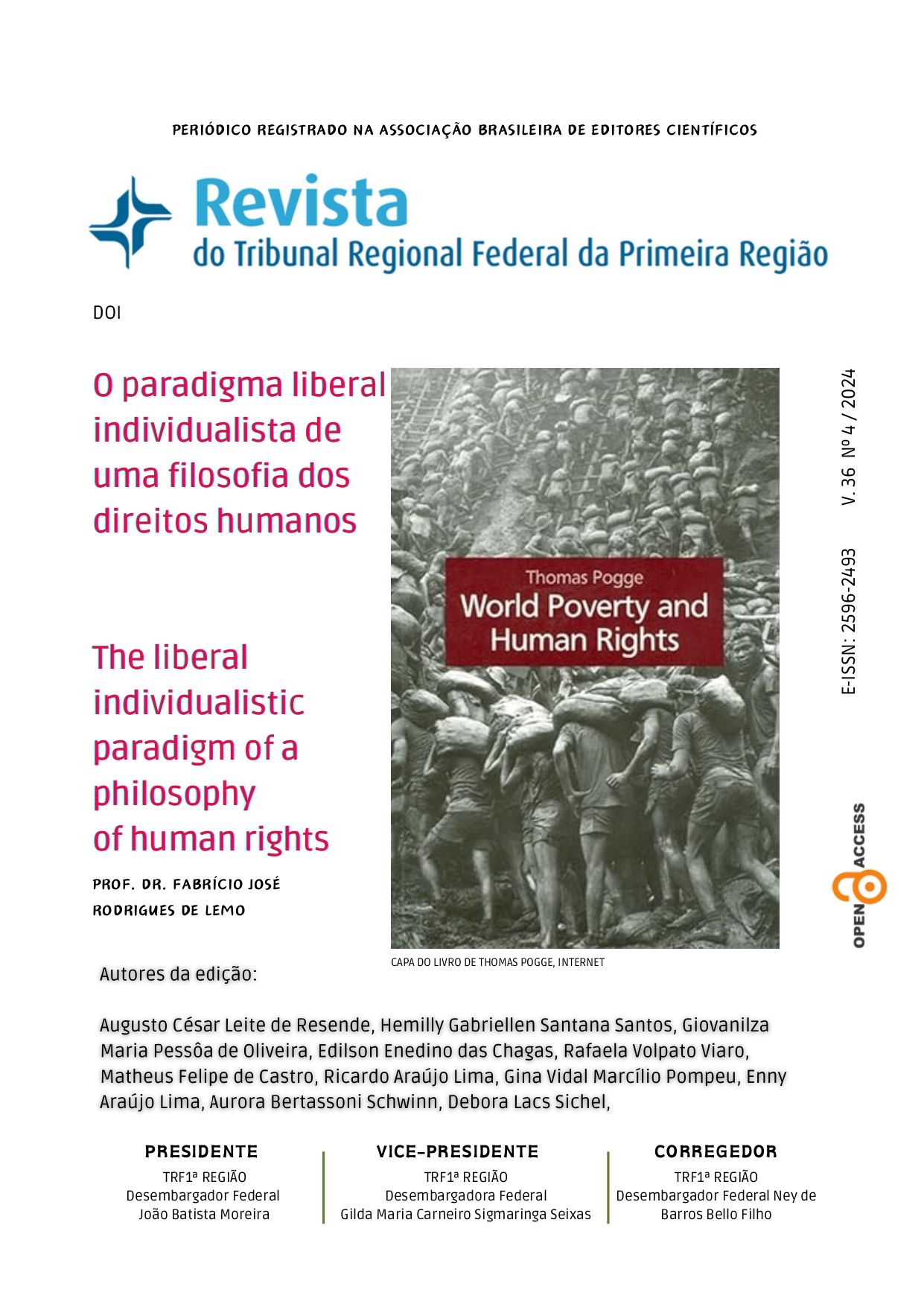O paradigma liberal individualista de uma filosofia dos Direitos Humanos
DOI:
https://doi.org/10.69519/trf1.v36i4.548Palavras-chave:
Direitos Humanos, Fundamentação filosófica, Moralidade, Justiça GlobalResumo
Os Direitos Humanos, dentre outras, possuem duas características que os distinguem dos demais direitos: sua universalidade e sua indivisibilidade. Entretanto, há disputa sobre o que pode ser arrolado nesta categoria especial de direitos universais – o que se procura visualizar no âmbito global é a existência de um grupo de Direitos Humanos tão amplamente difundido que inexiste contestação sobre sua importância e sobre sua universalidade. Nesse sentido, utilizando método de pesquisa bibliográfico, o artigo, partindo da fonte de fundamentação liberal individualista dos direitos fundamentais em âmbito mundial, buscará, em decorrência da existência de direitos similares em países totalmente díspares – i.e., Direitos Humanos universalizáveis -, refletir sobre o que podem ser caracterizados como direitos amplamente universalizáveis, ou seja, direitos fundamentais incontestáveis ou, ainda, o que poderia ser considerado um mínimo denominador moral global.
Downloads
Referências
ANNAN, Kofi A. Prefácio. In: MOTA, Romany. (Org.). 50 anos da declaração universal dos Direitos Humanos (1948-1998). Brasília: Conselho Federal da Ordem dos Advogados do Brasil – Comissão Nacional de Direitos Humanos, 1998. não paginado.
BARRETTO, Vicente de Paulo. Ética e direitos humanos: aporias preliminares. In: TORRES, Ricardo Lobo (org.) Legitimação dos direitos humanos. Rio de Janeiro: Renovar, 2002. p. 499-530.
_______; BRAGATO, Fernanda Frizzo. Leituras de filosofia do direito. Curitiba: Juruá, 2013. 332 p.
BEITZ, Charles R. Cosmopolitanism and global justice. In: BROCK, Gillian. MOELLENDORF, Darrel. (Org.). Current debates on global justice. Dordrecht: Springer, 2005. p. 11-27.
_______. Political theory and international relations. Princeton: Princeton University Press, 1999. 248 p.
_______. Rawls’s law of peoples. Ethics, [S.l.], v. 110, n. 4, p. 669-696, 2000. Disponível em: http://tinyurl.com/qagtwoo. Acesso em: 7 jul. 2015.
_______. The idea of human rights. Oxford: Oxford University Press, 2009. 235 p.
_______; GOODIN, Robert E. (Org.). Global basic rights. Oxford: Oxford University Press, 2009. 256 p.
BOBBIO, Norberto. A era dos direitos. Rio de Janeiro: Campus, 1992.
BRAGATO, Fernanda. Os direitos humanos como critério de justiça nas sociedades plurais. Revista Acadêmica – Faculdade de Direito do Recife, Recife, v. 82, p. 119-137, 2010.
BROCK, Gillian. Global justice. In: ZALTA, Edward. (Org.). Stanford encyclopedia of philosophy. Stanford, Mar. 06 2015. Disponível em: http://plato.stanford.edu/entries/justice-global/. Acesso em: 17 maio 2015.
_______. Global justice: a cosmopolitan account. Oxford: Oxford University Press, 2009. 366 p.
_______; BENATAR, Solomon. (Org.). Global health and global health ethics. Cambridge, UK: Cambridge University Press, 2011. 342 p.
_______; BLAKE, Michael. Debating brain drain: may governments restrict emigration? New York: Oxford University Press, 2015. 304 p.
_______; BRIGHOUSE, Harry. (Org.). The political philosophy of cosmopolitanism. Cambridge, UK: Cambridge University Press, 2005. 262 p.
_______; MOELLENDORF, Darrel. (Org.). Current debates on global justice. Dordrecht: Springer, 2005. 306 p.
BUCHANAN, Allen. The heart of human rights. New York: Oxford University Press, 2013.
_______; GOLOVE, David. Philosophy of international law. In: COLEMAN, Jules; SHAPIRO, Scott. (Org.). The Oxford handbook of jurisprudence & philosophy of law. Oxford: Oxford University Press, 2004. p. 868-934.
COMPARATO, Fábio K. A afirmação histórica dos direitos humanos. São Paulo: Saraiva,1999.
DONNELLY, Jack. Universal human rights in theory and practice. Ithaca: Cornell University Press, 2013. 320 p.
DOUZINAS, Costas. The end of human rights: critical legal thought at the turn of the century. Oxford: Hart Publishing, 2000. 410 p.
_______; GEARTY, Conor. (Org.). The meanings of rights: the philosophy and social theory of human rights. Cambridge, UK: Cambridge University Press, 2014. 328 p.
DURANT, Will. A história da filosofia. São Paulo: Nova Cultural, 1996.
DWORKIN, Ronald. Justice for hedgehogs. Cambridge, Mass.: The Belknap Press of Harvard University Press, 2011. 506 p.
_______. Levando os direitos a sério. São Paulo: WMF Martins Fontes, 2014. 568 p.
_______. O império do Direito. 3. ed. São Paulo: Martins Fontes – Selo Martins, 2014. 513 p.
_______. Uma questão de princípio. 2. ed. São Paulo: Martins Fontes, 2010. 593 p.
FAGAN, Andrew. Philosophical foundations of human rights. In: CUSHMAN, Thomas. (Org.). Handbook of Human Rights. London: Routledge, 2012. p. 9-22.
FERRY, Luc. Aprender a viver: filosofia para os novos tempos. Rio de Janeiro: Objetiva, 2007a.
_______. O homem Deus – ou o sentido da vida. Rio de Janeiro: Difel, 2007b.
FLYNN, Jeffrey. Habermas on human rights: law, morality and intercultural dialogue. Social Theory and Practice, [S.l.], v. 29, n. 3, p. 431-457, 2003. Disponível em: http://tinyurl.com/nsg72uv. Acesso em: 12 out. 2015.
FORST, Rainer. Contexts of justice: political philosophy beyond liberalism and communitarianism. Berkeley: University of California Press, 2002. 346 p.
_______. Justice, morality and power in the global context. In: POGGE, Thomas. FOLLESDAL, Andreas. (Org.). Real world justice: grounds, principles, human rights and social institutions. Dordrecht: Springer, 2005. p. 27-36.
_______. Justification and critique: towards a critical theory of politics. Cambridge: Polity, 2014. 216 p.
_______. The right to justification: elements of a constructivism theory of justice. New York: Columbia University Press, 2012. 351 p.
GARGARELLA, Roberto. As teorias da justiça depois de Rawls: um breve manual de filosofia política. São Paulo: WMF Martins Fontes, 2008. 261 p.
GEARTY, Conor. Human rights: the necessary quest for foundations. In: DOUZINAS, Costas; GEARTY, Conor. (Org.). The meanings of rights: the philosophy and social theory of human rights. Cambridge: Cambridge University Press, 2014. p. 21-38.
GRIFFIN, James. On human rights. Oxford: Oxford University Press, 2008. 339 p.
HABERMAS, Jürgen. A inclusão do outro: estudos de teoria política. São Paulo: Loyola, 2002. 390 p.
_______. The concept of human dignity and the realistic utopia of human rights. Metaphilosophy, Oxford, vol. 41, n. 4, p. 464-480, 2010. Disponível em: http://tinyurl.com/ocvo5jm. Acesso em: 12 out. 2015.
_______; RAWLS, John. Debate sobre el liberalismo político. Barcelona: Paidós, 1998. 181 p.
JAGAR, Alisson. (Org.). Thomas Pogge and his critics. Cambridge, UK: Polity, 2010. 272 p.
KANT, Immanuel. À paz perpétua. Porto Alegre: L&PM, 2011. 96 p.
_______. Fundamentação da metafísica dos costumes. São Paulo: Discurso Editorial: Barcarolla, 2009. 501 p.
KELLY, Erin. Editor’s foreword. In: RAWLS, John. Justice as fairness: a restatement. Cambridge, Mass.: The Belknap Press of Harvard University Press, 2001. p. xi-xii.
LEMOS, Fabrício José Rodrigues; BARRETTO, Vicente de Paulo. Uma abordagem compreensiva da dignidade humana. Quaestio Iuris, Rio de Janeiro, v. 08, n. 03, p. 1815-1826, 2015. Disponível em: http://tinyurl.com/hjl6bl6. Acesso em: 29 dez. 2015.
LEMOS, Fabrício José Rodrigues; PINTO, Gerson Neves. Uma abordagem compreensiva do individualismo. Quaestio Iuris, Rio de Janeiro, v. 09, n. 01, p. 288-308, 2016. Disponível em: https://tinyurl.com/ycl34tmg. Acesso em: 17 set. 2018.
MARTÍNEZ, Alejandro Rosillo. Fundamentación de derechos humanos desde América Latina. México: Itaca, 2013. p. 29-66.
MILLER, David. Principles of social justice. Cambridge: Harvard University Press, 1999. 337 p.
MOYN, Samuel. The last utopia: human rights in history. Cambridge, Mass.: The Belknap Press of Harvard University Press, 2010. 357 p.
_______. Plural cosmopolitanisms and the origins of human rights. In: DOUZINAS, Costas; GEARTY, Conor. (Org.). The meanings of rights: the philosophy and social theory of human rights. Cambridge: Cambridge University Press, 2014. p. 193-211.
NAGEL, Thomas. The problem of global justice. Philosophy and Public Affairs, [S.l.], v. 33, n. 2, p. 113-147, 2005. Disponível em: http://tinyurl.com/ond56ad. Acesso em: 14 jun. 2015.
OHLIN, Jens David. The assault on International Law. Oxford, UK: Oxford University Press, 2015. 304 p.
ORGANIZAÇÃO das Nações Unidas (ONU). Declaração universal dos direitos humanos. 1948. Disponível em: http://tinyurl.com/kx3rtad. Acesso em: 12 jul. 2015.
PERRY, Michael J. The morality of human rights. San Diego Law Review, San Diego, v. 50, n. 775, p. 775-812, 2013. Disponível em: http://tinyurl.com/o2qwjhp. Acesso em: 05 set. 2015.
POGGE, Thomas. (Org.). Freedom from poverty as a human right: who owes what to the very poor. New York: Oxford University Press, 2007a. 406 p.
POGGE, Thomas. An egalitarian law of peoples. Philosophy and Public Affairs, [S.l.], v. 23, n. 3, p. 195-224, 1994. Disponível em: http://tinyurl.com/nezgzzm. Acesso em: 16 jun. 2015.
_______. “Assisting the global poor”. In: CHATTERJEE, Deen K. The ethics of assistance: morality and the distant needy. Cambridge, UK: Cambridge University Press, 2004a. Disponível em: http://tinyurl.com/zzsudzo. Acesso em: 15 dez. 2015.
_______. Do Rawls’s two theories of justice fit together? In: MARTIN, Rex; REIDY, David A. (Org.). Rawls’s law of peoples: a realistic utopia. Oxford: Blackwell Publishing, 2006. p. 206-225.
_______. Ending poverty. 2012a. 1 post (20 min 46 s). Postado em: 2012. Disponível em: http://tinyurl.com/grcbatc. Acesso em: 23 jan. 2015.
_______. John Rawls: His life and theory of justice. New York: Oxford University Press, 2007b. 228 p.
_______. Politics as usual: what lies behind the pro-poor rhetoric. Sttaford: Polity, 2010. 224 p.
_______. Priorities of global justice. Metaphilosophy, [S.l.], v. 32, n. 1/2, p. 6-24, 2001. Disponível em: http://tinyurl.com/qe8628y. Acesso em: 16 jun. 2015.
_______. Realizing Rawls. Ithaca: Cornell University Press, 1989. 296 p.
_______. Real world justice. In: BROCK, Gillian; MOELLENDORF, Darrel. (Org.). Current debates on global justice. Dordrecht: Springer, 2005b. p. 29-53.
_______. The incoherence between Rawls’s theories of justice. Fordham Law Review, [S.I.], 72, 2004b. p. 1739-1759. Disponível em: http://tinyurl.com/h57akll. Acesso em: 29 dez. 2015.
_______. The international significance of human rights. The Journal of Ethics, [S.I.], 4, n. 1/2, 2000. p. 45-69. Disponível em: http://www.jstor.org/stable/25115635. Acesso em: 27 jan. 2016.
_______. World poverty and human rights. Ethics & International Affairs, [S.l.], 19, n. 1, 2005a. p. 1-7. Disponível em: http://tinyurl.com/qanu4zz. Acesso em: 16 jun. 2015.
_______. World poverty and human rights: cosmopolitan responsibilities and reforms. Cambridge: Polity, 2002. 284 p.
RAWLS, John. A theory of justice: revised edition. Cambridge, Mass.: The Belknap Press of Harvard University Press, 1999a. 539 p.
_______. O direito dos povos. São Paulo: Martins Fontes, 2001a. 259 p.
_______. O liberalismo político. 2. ed. São Paulo: Ática, 2000. 430 p.
_______. Law of peoples and the idea of public reason revisited. Cambridge: Harvard University Press, 1999b. 207 p.
_______. Justice as fairness: a restatement. Cambridge, Mass.: The Belknap Press of Harvard University Press, 2001b. 214 p.
_______. Uma teoria da justiça. São Paulo: Martins Fontes, 1997. 708 p.
_______. Uma teoria da justiça. 3. ed. São Paulo: Martins Fontes, 2008. 764 p.
_______. The idea of an overlapping consensus. Oxford Journal of Legal Studies, Oxford, v. 07, n. 1, p. 1-25, 1987. Disponível em: http://tinyurl.com/nbxedpf. Acesso em: 24 dez. 2015.
_________. FREEMAN, Samuel. (Ed.). Collected papers. Cambridge, Mass.: Harvard University Press, 1999. 656 p.
ROSEN, Michael. Dignity: its history and meaning. Cambridge, Massachussetts: Harvard University Press, 2012.
SILVA, José Afonso da. Curso de Direito Constitucional Positivo. São Paulo: Malheiros, 1993.
SUPIOT, Alain. Homo Juridicus: ensaio sobre a função antropológica do Direito. São Paulo: WMF Martins Fontes, 2007.
SYSE, Henrik. From Natural Law to Human Rights – some reflections on Thomas Pogge and Global Justice. In: POGGE, Thomas. FOLLESDAL, Andreas. (Org.). Real world justice: grounds, principles, human rights and social institutions. Dordrecht: Springer, 2005. p. 229-238.
TAYLOR, Charles. (Org.). Multiculturalismo. Lisboa: Instituto Piaget, 1998.
Downloads
Publicado
Como Citar
Edição
Seção
Licença
Copyright (c) 2024 Revista do Tribunal Regional Federal da 1ª Região

Este trabalho está licenciado sob uma licença Creative Commons Attribution-NonCommercial-NoDerivatives 4.0 International License.
Ao submeterem artigos à Revista do Tribunal Regional Federal da Primeira Região, os autores declaram ser titulares dos direitos autorais, respondendo exclusivamente por quaisquer reclamações relacionadas a tais direitos, bem como autorizam a Revista, sem ônus, a publicar os referidos textos em qualquer meio, sem limitações quanto ao prazo, ao território, ou qualquer outra. A Revista fica também autorizada a adequar os textos a seus formatos de publicação e a modificá-los para garantir o respeito à norma culta da língua portuguesa.





















